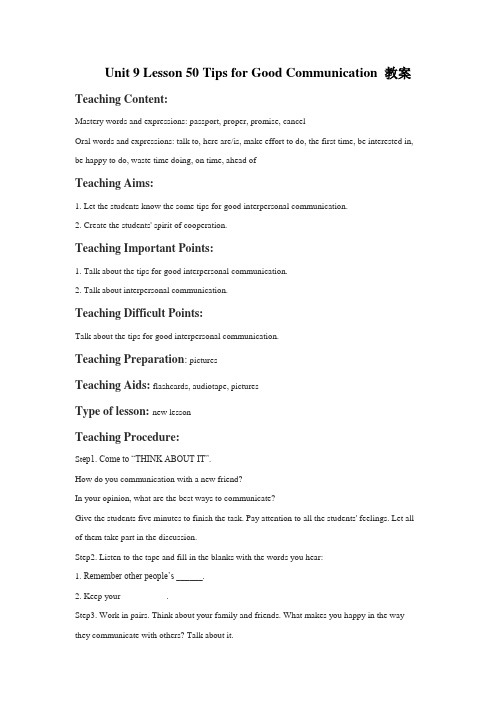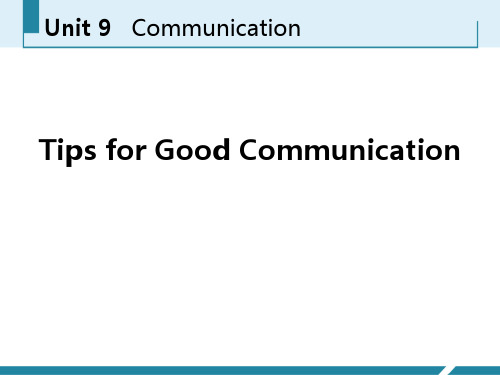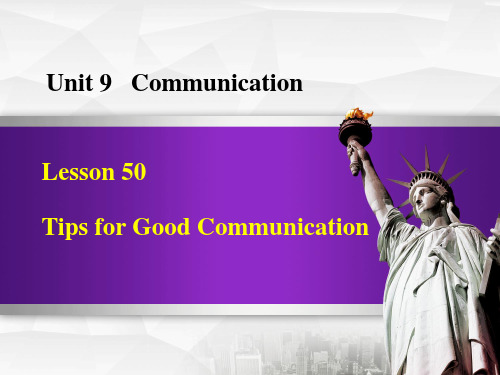《Tips for Good Communication》Communication PPT课件【优秀课件PPT】
- 格式:pptx
- 大小:3.77 MB
- 文档页数:16

Unit 9 Lesson 50 Tips for Good Communication 教案Teaching Content:Mastery words and expressions: passport, proper, promise, cancelOral words and expressions: talk to, here are/is, make effort to do, the first time, be interested in, be happy to do, waste time doing, on time, ahead ofTeaching Aims:1. Let the students know the some tips for good interpersonal communication.2. Create the students' spirit of cooperation.Teaching Important Points:1. Talk about the tips for good interpersonal communication.2. Talk about interpersonal communication.Teaching Difficult Points:Talk about the tips for good interpersonal communication.Teaching Preparation: picturesTeaching Aids: flashcards, audiotape, picturesType of lesson: new lessonTeaching Procedure:St ep1. Come to “THINK ABOUT IT”.How do you communication with a new friend?In your opinion, what are the best ways to communicate?Give the students five minutes to finish the task. Pay attention to all the students' feelings. Let all of them take part in the discussion.Step2. Listen to the tape and fill in the blanks with the words you hear:1. Remember other people’s ______.2. Keep your __________.Step3. Work in pairs. Think about your family and friends. What makes you happy in the way they communicate with others? Talk about it.Step4. Read the text and tell the main idea of the text in the students' own words.Let the students speak in front of the class. Encourage them not to be shy when they stand there. Give the students chances to speak loudly in front of the class.Step5. Encourage the students to ask more questions about this part.Divide the class into groups of three or four to finish the task. Ask all of the students to take part in the discussion.Step6. Homework1. Finish off the exercises in the textbook on page 133.2. Go on the next reading in the student book.。





改善沟通技巧英语作文Improving Communication Skills。
Communication is the key to success in both personal and professional relationships. It is essential to be able to express oneself clearly and effectively in order to convey thoughts, feelings, and ideas to others. However, many people struggle with communication, whether it be due to shyness, lack of confidence, or simply not knowing how to effectively get their message across. In this essay, we will explore some strategies for improving communication skills.First and foremost, it is important to be a good listener. Communication is a two-way street, and listening is just as important as speaking. When someone is speaking to you, make sure to give them your full attention, maintain eye contact, and show that you are engaged in the conversation. By actively listening, you not only show respect to the speaker but also gain a better understandingof what they are trying to communicate.Secondly, it is important to be mindful of your body language. Nonverbal cues such as facial expressions, gestures, and posture can convey a lot of information to others. By being aware of your body language, you can ensure that your message is being received in the way you intended. For example, standing up straight and making eye contact can convey confidence and assertiveness, while slouching and avoiding eye contact can make you appear disinterested or insecure.Another important aspect of communication is being able to express oneself clearly and concisely. Avoid using jargon or overly complex language that may confuse your audience. Instead, use simple and straightforward language that is easy to understand. Additionally, be mindful of your tone of voice and try to convey your message in a friendly and respectful manner.In addition to verbal communication, written communication is also an important skill to master. Whetherit be emails, reports, or presentations, being able towrite clearly and effectively is crucial in theprofessional world. Make sure to proofread your written communication for errors and clarity before sending it out, and always consider your audience when choosing the toneand style of your writing.Lastly, practice makes perfect. The more you practice your communication skills, the more confident andproficient you will become. Take every opportunity to engage in conversations, whether it be with friends, family, or colleagues. Join a public speaking club or take a communication skills course to further develop your abilities. Remember, communication is a skill that can be learned and improved upon with time and effort.In conclusion, improving communication skills is essential for success in both personal and professional relationships. By being a good listener, mindful of your body language, clear and concise in your speech, proficient in written communication, and practicing regularly, you can become a more effective communicator. Remember,communication is the key to building strong connections with others and achieving your goals.。
Effective communication is crucial in any relationship, whether it's with a partner, family member, friend, or colleague. It's the foundation of a strong and healthy connection, and without it, misunderstandings, conflicts, and resentment can arise. Here are some tips for improving communication in relationships:1. Listen actively: One of the most important aspects of effective communication is being a good listener. This means giving the other person your full attention, maintaining eye contact, and refraining from interrupting. It also involves asking clarifying questions and showing empathy and understanding.2. Be open and honest: Honesty is key in any relationship. It's important to express your thoughts and feelings openly and honestly, and to encourage the other person to do the same. This can create an environment of trust and understanding.3. Use "I" statements: When expressing your feelings or concerns, use "I" statements instead of "you" statements. For example, instead of saying "You never listen to me," say "I feel like my opinions aren't being heard." This shifts the focus from blaming the other person to expressing your own emotions.4. Avoid passive-aggressive behavior: Passive-aggressive behavior can be detrimental to effective communication. Instead of making sarcastic remarks or giving the silent treatment, address the issue directly and assertively.5. Seek to understand before being understood: Before jumping to conclusions or trying to make yourself understood, take the time to understandthe other person's perspective. This can help prevent misunderstandings and conflicts.6. Practice empathy: Empathy is the ability to understand and share the feelings of another person. Practice empathy by putting yourself in the other person's shoes and trying to see things from their perspective.7. Be respectful: Respect is fundamental in effective communication. Treat the other person with kindness, consideration, and respect, even if you disagree with them.8. Use nonverbal communication: Nonverbal communication, such as body language, facial expressions, and tone of voice, can convey a lot of meaning. Pay attention to your nonverbal cues and be mindful of the other person's as well.9. Validate the other person's feelings: Even if you don't agree with the other person's feelings or opinions, it's important to validate them. This can help the other person feel understood and create a sense of connection.10. Take a time-out if needed: If a conversation becomes heated or emotions are running high, it's okay to take a time-out and come back to it later. This can prevent escalation and allow both parties to cool down and approach the conversation more rationally.11. Practice active problem-solving: Instead of just venting or complaining, focus on finding solutions together. This can involve brainstorming, compromising, and finding common ground.12. Show appreciation: Expressing gratitude and appreciation for the otherperson can strengthen the bond and create a positive communication environment.13. Seek feedback: Ask for feedback on your communication style and how the other person feels about your interactions. This can help you identify areas for improvement and make necessary adjustments.14. Practice self-awareness: Be mindful of your own communication habits and how they may be affecting the relationship. Practice self-reflection and strive to improve your communication skills.15. Seek professional help if needed: If communication issues persist and are causing significant distress in the relationship, consider seeking the help of a therapist or counselor. They can provide guidance and support in improving communication and resolving conflicts.。